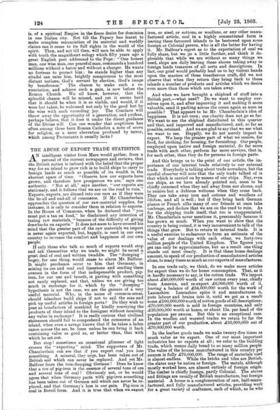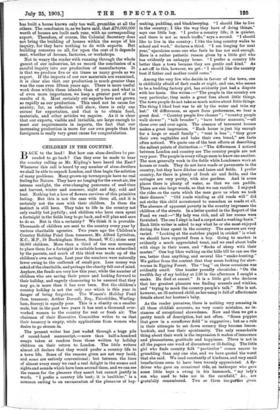THE ABUSE OF EXPORT TRADE STATISTICS.
ANintelligent visitor from Mars would gather, from a perusal of the current newspapers and reviews, that the. British nation is imbued with the belief that the proper way for an island to grow rich is to build ships to carry to foreign lands as much as possible of its wealth in the shortest space of time. " Observe how our exports have grown, and therefore how prosperous we are," says one authority. " Not at all," says another, " our exports are stationary, and it follows that we are on the road to ruin." Exports, exports, are dinned into our ears as if they were the be-all and end-all of commerce. If Mr. Chamberlain approaches the question of our raw-material supplies, for instance, it is only to consider them in relation to exports. In the House of Commons, when he declared that " you must put a tax on food," he disclaimed any intention of taxing raw materials, " because of the difficulty of giving drawbacks on exports." It does not seem to have crossed his mind that the greater part of the raw materials we import is never again exported, but, happily, is used in our own country to increase the comfort and happiness of our own people.
If only those who talk so much of exports would stop and ask themselves why we trade, we might be saved a great deal of oral and written twaddle. The "dumping " bogey, for one thing, would cease to alarm Mr. Balfour. It might perchance occur to him that Germany, in mining its ore and coal and limestone and sending them oversea in the form of that indispensable product, pig- iron, for our use and benefit, is parting with something not easily replaced, and that, unless we are giving too much in exchange for it, which by the " dumping " hypothesis is not the case, we are the gainers of a very useful material. Why, in the name of common-sense, should islanders build ships if not to sail the seas and pick up useful articles in foreign ports ? Do they wish to pose as benefactors of mankind by kindly conveying the products of their island to the foreigner without receiving any value in exchange ? It is really curious that civilised statesmen should fail to comprehend the commerce of an island, when even a savage knows that if he takes a laden canoe across the sea, he loses unless he can bring it back containing value as good as, or better than, that with which he set out.
But stop ! sometimes an occasional glimmer of light crosses the " exporting " mind. The supporters of Mr. Chamberlain can see that if you export coal you lose something. A mineral, they urge, has been taken out of British soil which can never be replaced. And yet Mr. Balfour fears the iron-dumping German ! Does he know that a ton of pig-iron is the essence of several tons of ore and several tons of coal ? Obviously not, or he would agree that when Germany parts with pig-iron something has been taken out of German soil which can never be re-. placed, and that Germany's loss is our gain. Pig-iron is coal in Bovril form. And it is true that when wa export for a great variety of craftsmen, each of which, as he who iron, or steel, or cottons, or woollens, or any other manu- factured article, coal in a highly concentrated form is leaving these favoured islands to be bestowed upon some foreign or Colonial person, who is all the better for having it. Mr. Balfour's regret as to the exportation of coal we fully share, but we go a little further, and think it de- plorable that while we are without so many things we need, ships are daily leaving these shores taking away to foreign lands treasures •of all sorts and descriptions. In fact, our grief would probably lead us to lay violent hands upon the masters of these treacherous craft, did we not observe that when they return they bring back to these islands a number of products and articles which we desire even more than those which are taken away.
And when we have brought a shipload of stuff into a British port,—what nese? Do we want to employ our- selves upon it, and after improving it and making it more valuable, send it packing across the ocean again as soon as possible ? That appears to be Mr. Chamberlain's idea of happiness. It is not ours ; our charity does not go so far. We want to see the shipload distributed to this quarter and that, and improved and manufactured, and, so far as possible, retained. And we are glad to say that we see what we want to see. Happily, we do not merely import to export. We keep the greater part of what we receive, for food, for clothing, for housing, for furnishing. Our people, employed upon native and foreign material, do far more trade with each other, perform far more services, that is, for each other, than they do for persons in foreign parts.
And this brings us to the point of our article, the im- portance of our internal trade relatively to our external trade. Everybody is talking about trade nowadays, but the careful observer will note that the only trade talked of is that which is carried on by means of our ships. Nay, even our ships, as we have already pointed out, seem to be chiefly esteemed when they sail away from our shores, and to receive but a dubious welcome when they come back. They can take away iron and cottons and woollens ad libitum, and all is well ; but if they bring back German pianos or French silks many of our friends at once take umbrage, and declare that we are on the road to ruin. As for the shipping trade itself, that too is unappreciated. Mr. Chamberlain never mentions it, presumably because it has grown so much. When you want to show that the country is being ruined, it is very inconvenient to talk of the things that grow. But to return tb internal trade. It is a useful exercise to endeavour to form an estimate of the value of our dealings with each other, we forty-two million people of the United Kingdom. The figures you get can only be approximations, but as a result one thing stands out most clearly. It is that these home dealings amount, to speak of our production of manufactured articles alone, to many times as much as our exports of manufactures.
In one trade only, we think, do we make more articles for export than we do for home consumption. That, as it is hardly necessary to say, is the cotton trade. We import about .40,000,000 worth of raw cotton every year, chiefly from America, and re-export £6,000,000 worth of it, leaving a balance of £34,000,000 worth for the work of Lancashire. Lancashire spins it and manufactures it, puts labour and brains into it, until we get as a result some £100,000,000 worth of cotton goods of all descriptions; £70,000,000 worth is sold in foreign countries, and only £30,000,000 worth at home, or about 15s. per head of the population per annum. But this is an exceptional case. In the woollen and worsted trades we retain by far the greater part of our production, about £50,000,000 out of £70,000,000 worth.
In the leather goods trade we make twenty-five times as much value. as we export. One of our most important industries has no exports at all ; we refer to the building trade, which means daily bread to so many million people. The value of the houses manufactured in this country per annum is fully £70,000,000. The range of materials used is almost endless. While the bricks and tiles are British, the slates may be native or foreign. The metals, although mostly worked here, are almost entirely of foreign origin. The timber is chiefly foreign, partly Colonial. The stoves and fittings are usually of British manufacture, but foreign material. A house is a conglomeration of raw, half-manu- factured, and fully manufactured articles, providing work
has built a house knows only too well, grumbles at all the others. The conclusion is, as we have said, that £70,000,000 worth of houses are built each year, with no corresponding export. Therefore, of course, the Colonial Secretary does not bring the building of houses within the scope of his inquiry, for they have nothing to do with exports. But building concerns us all, for upon the cost of it depends rent, whether of .houses, factories, or workshops.
Not to weary the reader with running through the whole gamut of our industries, let us record the conclusion of a careful inquiry into our production of manufactures. It is that we produce five or six times as many goods as we export. If the imports of our raw materials are examined, it is clear also that our production is much greater than was the case even fifteen years ago. There is more useful work done within these islands than of yore, and what is of even more importance, we keep a greater part of the results of it. Most certainly our exports have not grown so rapidly as our production. This need not be cause for anxiety, for, as reflection will show, there is only one excuse for exportation, and that is to obtain food, materials, and other articles we require. As it is clear that our exports, visible and invisible, are large enough to meet our requirements in imports, the fact that our increasing production is more for our own people than for foreigners is really very great cause for congratulation.







































 Previous page
Previous page